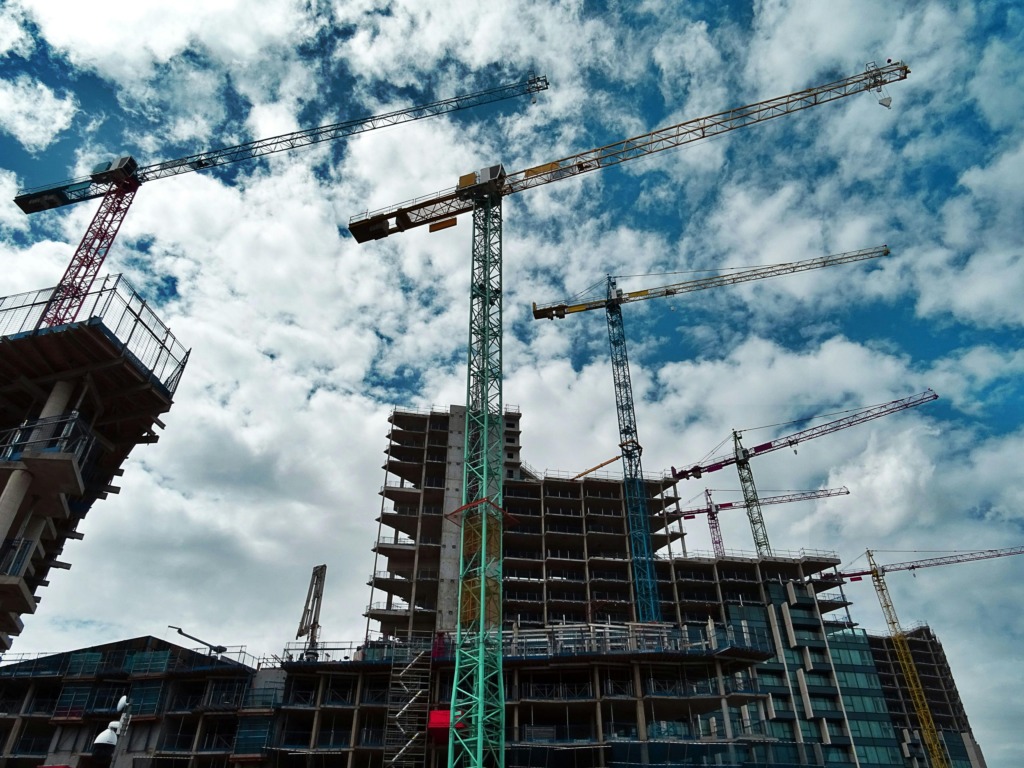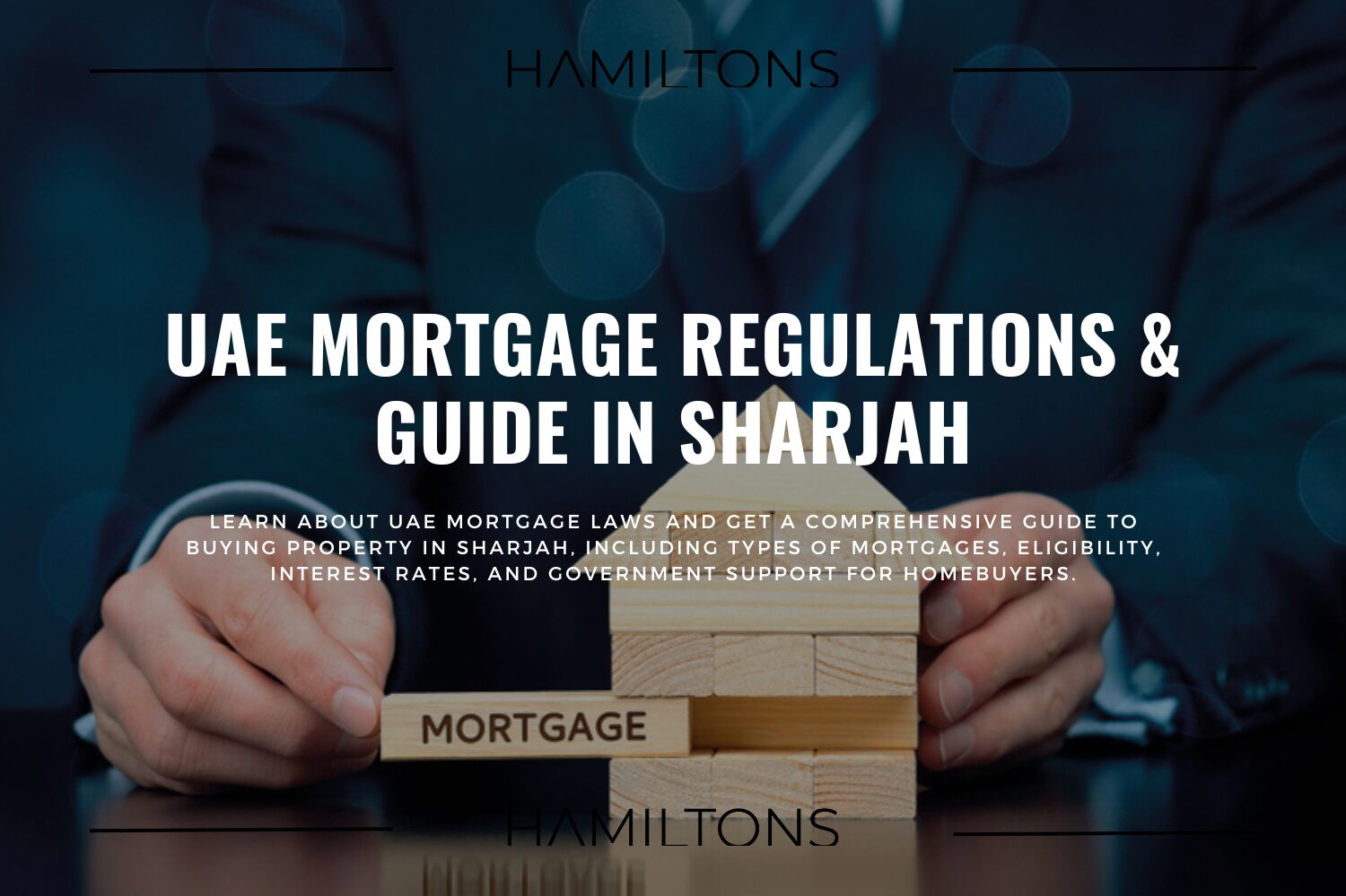Understanding mortgage laws is crucial when you’re looking to buy property in the UAE, especially in Sharjah.
Whether you’re an expatriate or a UAE national, navigating the legal landscape ensures a smooth property purchase. With Sharjah’s growing real estate market, now is the perfect time to explore your mortgage options.
Why Sharjah?
Sharjah is becoming an attractive destination for property investment. With its affordable real estate prices compared to Dubai and Abu Dhabi, the market is thriving.
The city offers a blend of modernity and tradition, making it ideal for families and professionals alike. Plus, Sharjah has streamlined its mortgage and property laws to encourage foreign investment, making it easier for expatriates to purchase homes.
Types of Mortgages In The UAE

There are two primary types of mortgages available in Sharjah:
Conventional Mortgages:
These are standard loans where the bank lends you money to buy a property, and you repay the loan with interest.
Fixed-Rate Mortgages: Offer a consistent interest rate for a specified period, providing stability in monthly payments.
Variable-Rate Mortgages: Have interest rates that fluctuate based on market conditions. They can be advantageous if interest rates decline but pose risks if they rise.
Islamic Mortgages:
Based on Islamic finance principles, these loans comply with Sharia law. Instead of interest, the bank buys the property and sells it back to you with a profit margin.
Murabaha: A sale-purchase contract where the bank buys a property and then sells it to the borrower at a markup.
Ijarah: A lease-to-own contract where the bank leases the property to the borrower with an option to purchase it at the end of the lease term.
Key Considerations When Choosing a Mortgage:
- Interest Rates: Compare rates from different lenders to find the most favorable terms.
- Repayment Terms: Consider the length of the mortgage and the associated monthly payments.
- Down Payment: Determine the required down payment and any associated fees.
- Eligibility Criteria: Ensure you meet the lender’s eligibility requirements, such as income, credit score, and residency status.
By understanding these mortgage types and considering your specific needs, you can make an informed decision and find the most suitable financing option for your property purchase in Sharjah.
Eligibility Criteria for a Mortgage in Sharjah
When applying for a mortgage in Sharjah, lenders typically have specific criteria to assess your eligibility. These criteria may vary depending on the lender and the type of mortgage you’re seeking. However, some common requirements include:

1. Income:
A UAE National earning at least AED 10,000, or a UAE resident earning at least AED 15,000. an expat employed in the UAE for at least 3 years with at least 1 year in your current job. not older than 65 years old if salaried, or 70 years old if self-employed*, when the loan matures.
Nearly everyone can get a mortgage within the UAE as long as you can demonstrate your income. Income can be from a variety of sources including salary, commission, and rental income.
- Steady Employment: You must have a stable job with a consistent income.
- Minimum Income: Lenders often require a minimum income level to ensure you can afford the monthly mortgage payments.
2. Credit Score:
- Good Credit History: A strong credit score is essential to demonstrate your ability to manage debt responsibly.
- Credit Report: Lenders will review your credit report to assess your past borrowing behavior.
3. Down Payment:
- Minimum Down Payment: Most lenders require a minimum more or less 20% Down Payment, which can vary depending on the property type and your financial situation.
- Loan-to-Value (LTV) Ratio: Lenders calculate the LTV ratio based on the loan amount compared to the property’s value. A higher LTV ratio may require additional collateral or a higher interest rate.
4. Residency Status:
To be eligible for a mortgage in Sharjah, you typically need to have a valid residency status within the United Arab Emirates (UAE). This requirement ensures that you have a stable connection to the country and are more likely to repay the loan.
Common residency statuses accepted for mortgage applications include:
- Emirati Citizen: If you are a citizen of the UAE, you generally meet the residency requirements.
- Resident Visa: Individuals with a valid resident visa issued by the UAE government can often apply for a mortgage. This includes visas for employment, family sponsorship, or other valid reasons.
- Golden Visa: Holders of Golden Visas, which provide long-term residency and benefits, are typically eligible for mortgages.
Additional considerations:
- Visa Validity: Your residency visa must be valid for a sufficient period to meet the lender’s requirements.
- Proof of Residency: You may need to provide documentation to prove your residency status, such as a copy of your visa, passport, and Emirates ID.
Note: The specific residency requirements may vary depending on the lender and the type of mortgage you’re applying for.
5. Age:
- Minimum and Maximum Age: Lenders may have age restrictions for mortgage applicants. The minimum age limit is generally 21 and the maximum term is up to age 65 for employed expats or 70 for UAE nationals and self-employed expats.
6. Debt-to-Income Ratio:
According to the UAE Central Bank, your DBR ratio must not exceed 50% for you to be eligible for more finance. Put simply, you can only use half of your income to pay towards your debts. Banks check your credit score before lending finance to determine your DBR.
- Financial Stability: Lenders assess your debt-to-income ratio to ensure you can comfortably handle your mortgage payments in addition to other debts.
7. Employment History:
Typically, you need to have been in your current job for at least six months to a year, depending on the location and lender’s policies. Self-employed individuals must have been operating their businesses for at least two years. Having an existing relationship with the bank can be advantageous.
- Job Stability: A stable employment history, particularly in your current role, is often required.
It’s important to note that these criteria can vary between lenders and may be subject to change. It’s advisable to consult with a mortgage broker or directly with lenders to get specific information based on your individual circumstances.
Mortgage Application Process In Sharjah
The mortgage application process in Sharjah is fairly straightforward but requires thorough documentation. Here’s a quick breakdown:
- Choose a lender: Compare different banks and lenders.
- Submit documentation: You’ll need proof of income, bank statements, identification, and property details.
- Get pre-approval: This will help you understand how much you can borrow.
- Property valuation: The bank will evaluate the property to ensure it aligns with the mortgage amount.
- Final approval: Once all checks are complete, the bank will issue the mortgage.
Interest Rates and Loan-to-Value (LTV) Ratio
Interest rates in Sharjah depend on various factors, such as the type of loan, the bank, and the borrower’s profile. The LTV ratio, which is the amount the bank is willing to lend compared to the property’s value, plays a critical role. Typically, expatriates can expect an LTV ratio of 75-80%, while UAE nationals might receive up to 85%.
Fixed vs Variable Interest Rates
Mortgages in Sharjah come with two main interest rate options:
- Fixed Interest Rates: The rate stays the same throughout the loan term. This provides stability in monthly payments, making it easier to budget.
- Variable Interest Rates: These rates fluctuate based on market conditions. While they may offer lower initial payments, there’s the risk of increasing rates over time.
Legal Requirements for Mortgages In Sharjah
The UAE Central Bank governs all mortgage laws, ensuring transparency and fairness for both borrowers and lenders. To secure a mortgage, you’ll need a valid UAE residency, proof of employment, and legal documentation like the Sales and Purchase Agreement (SPA).
Mortgage Repayment Options
Mortgage repayments in Sharjah can be structured in various ways:
- Early repayment: Some lenders allow early repayments but may impose penalties.
- Late payments: Be mindful of late payment penalties, which can add to your financial burden.
When applying for a mortgage in Sharjah, it’s essential to understand the available repayment options. These options can significantly impact your monthly payments and overall financial burden. Here are some common choices:
1. Equal Monthly Installments (EMI):
- Fixed Amount: You pay a consistent amount each month throughout the loan term.
- Principal and Interest: Each payment includes a portion of the principal loan amount and interest.
2. Step-Up Payments:
- Increasing Amounts: The monthly payments gradually increase over time, typically tied to a specific schedule.
- Lower Initial Payments: This option can be beneficial for those with limited income initially, as it allows for lower payments in the early years.
3. Interest-Only Payments:
- Initial Period: You only pay the interest on the loan for a specified period, typically a few years.
- Principal Repayment: After the interest-only period, you begin repaying both principal and interest.
4. Balloon Payments:
- Large Final Payment: A significant portion of the loan principal is due as a lump sum payment at the end of the loan term.
- Lower Monthly Payments: This option can result in lower monthly payments during the initial years.
5. Accelerated Payments:
- Extra Payments: You can make additional payments on your mortgage beyond the required monthly installments.
- Reduced Loan Term: This can help you pay off the loan faster and potentially save on interest.
6. Flexible Repayment:
- Adjustable Payments: Some lenders offer flexibility in adjusting your monthly payments within certain limits based on your financial situation.
Factors to Consider When Choosing a Repayment Option:
- Financial Situation: Assess your current and future income to determine which option best suits your budget.
- Interest Rates: Consider the interest rate associated with each repayment option.
- Loan Term: A longer loan term generally results in lower monthly payments but higher overall interest costs.
- Financial Goals: Determine if you want to pay off the loan quickly or have more flexibility in your monthly payments.
It’s important to discuss these options with your lender or a mortgage broker to find the most suitable repayment plan based on your individual circumstances. By understanding the available options, you can make an informed decision and effectively manage your mortgage obligations.
Mortgage Insurance In The UAE
Mortgage insurance is a requirement in most cases, protecting both the borrower and the lender. Two common types are:
- Life Insurance: Covers the remaining mortgage if the borrower passes away.
- Property Insurance: Protects the property against damage or loss.
Mortgage insurance in the UAE is a crucial component of the homeownership process. It acts as a safety net for lenders, protecting them against financial losses in the event that a borrower defaults on their loan payments.
This insurance typically covers scenarios such as the borrower’s death or disability. By requiring mortgage insurance, lenders can mitigate their risk and ensure the stability of their financial institutions.
While it may add to the overall cost of homeownership, mortgage insurance provides peace of mind for both borrowers and lenders, knowing that the loan will be protected in unforeseen circumstances.
Choosing The Right Lender In Sharjah
Choosing the right lender in Sharjah is crucial for a successful mortgage application. Factors to consider include the lender’s reputation, interest rates, fees, and customer service. Researching different lenders, comparing offers, and reading customer reviews can help you identify the best fit.
Selecting the right lender is crucial. Consider factors like:
- Interest rates: Compare fixed and variable rates.
- Loan terms: Ensure the terms align with your financial situation.
- Reputation: Work with a lender that has a good reputation in the market.
Some top lenders in Sharjah include Emirates NBD, Mashreq, and Abu Dhabi Islamic Bank.
Additionally, consulting with a mortgage broker can provide valuable guidance and assistance in navigating the lending landscape in Sharjah. By carefully evaluating these factors, you can increase your chances of securing a favorable mortgage deal that aligns with your financial goals and needs.
Conclusion
Navigating the mortgage process in Sharjah may seem complex, but with the right knowledge and preparation, it can be a smooth journey. By understanding the types of mortgages, eligibility criteria, and legal requirements, you’ll be better equipped to make informed decisions about your property purchase in Sharjah.
FAQs
- Can expatriates get mortgages in Sharjah?
Yes, expatriates can obtain mortgages, although they may face higher down payments and stricter eligibility criteria. - What is the typical interest rate for mortgages in Sharjah?
Interest rates vary but generally range between 2.5% and 5%, depending on the lender and the borrower’s financial profile. - How long does it take to get a mortgage approved in Sharjah?
The approval process typically takes between 2-4 weeks, depending on the lender and the completeness of your documentation. - What is the minimum down payment required for expatriates?
Expats usually need to provide a down payment of 20-25% of the property value. - Are there government-backed mortgage programs for first-time buyers in Sharjah?
Yes, the Sharjah government offers support programs for first-time buyers, particularly UAE nationals.



